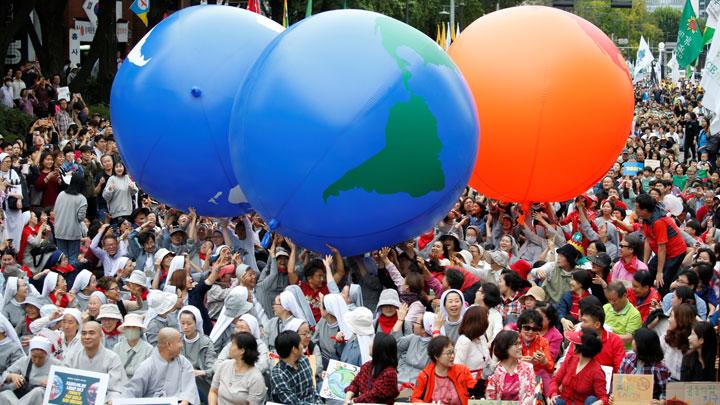Climate Change Endangers Scotland's Archaeological Treasures
Translator
Tempo.co
Editor
Laila Afifa
Kamis, 10 Oktober 2019 18:03 WIB

TEMPO.CO, Orkney - Experts have warned ancient British structures older than the pyramids are being threatened by climate change as rising sea levels, heavier rainfall, and severe weather events endanger Scotland's archaeological treasures.
The Orkney Islands, situated off the north coast of the Scottish mainland, are home to more than 3,000 historical sites.
Evidence has been found of human habitation there going back 8,500 years. Some buildings on the islands date to the Iron Age, Viking rule and medieval times.
But around 1,000 sites are situated on the coastline and are under threat.
One such site is the Iron Age building South Howe Broch on the island of Rousay. Dating from between 600-400AD, the sea has taken much of the site's western area. Now the broch wall itself is falling into the sea.
Julie Gibson, a lecturer at the University of the Highlands and Islands, says it will eventually disappear.
"What you can see just over here is the front door of the broch, exposed by the sea, taking away parts of the ruins and leaving a built wall still intact. And each year a little more falls like the sea batters it," she said as she stood on the cliff's edge.
"What we have discovered in recent years, through the use of geophysics and other things, is that... on this stretch of the coastline, all the settlement archaeology is within 100 metres of the coast edge. And so as the sea takes this heritage of ours away it's taking all that we have," she said.
A couple of hundred meters north of South Howe Broch is Midhowe Broch. This Iron Age building is well-preserved, courtesy of a sea wall built in the 1930s and well-maintained since. A spring-fed water tank, fireplace and room partitions are clearly visible. But even Midhowe Broch is at risk from climate change.
A climate risk assessment of Orkney's Neolithic sites, published by conservation public body Historic Environment Scotland (HES) in July this year, described the potential impact of climate change on the sites as "extreme" and their vulnerability as "high".
According to HES, average precipitation (rain, sleet and snow) has increased by 27% in Scotland since the early 1960s. In the same period, winter precipitation has gone up by more than 70% in parts of northern Scotland.
Wetter weather means buildings are wetter for longer, meaning water is more likely to penetrate masonry and decay it. It also leads to metal parts of buildings corroding and the ground becoming unstable. This can lead to structural collapse.
Sea levels are also rising and beach erosion is a growing problem.
Since 1970 some Orkney beaches have narrowed by an average of 16 inches (40 centimeters) per year since 1970. That is compared to an annual average loss of eight inches between 1890 and 1970, according to data from cross-governmental coastal change assessment partnership Dynamic Coast.
Increased storminess also threatens to damage Orkney's historical sites, HES says.
Arguably the most famous site of Orkney is Skara Brae. This Neolithic settlement, occupied from roughly 3100-2500BC, features a network of stone buildings. When inhabited it was approximately one kilometer (0.6 miles) from the sea with a freshwater loch and sand dunes in between. Now it sits only a few meters from the North Atlantic.
Visitors can see the settlement's 5,000-year-old hearths, bed recesses, cupboards and dressers. Some 112,000 people visited it in 2018.
"Climate change is a really real present risk. The climate has already changed because of the influence of humans. And it's going to continue to change and that pace of change is going to speed up," said HES climate change scientist, David Harkin.
"So the risk to sites like Skara Brae and other sites around Orkney, it's real, it's here, it's happening. But it shouldn't all be doom and gloom and despair. There is an opportunity to still do something about it and to avoid the worst possible consequences of climate change," he added.
REUTERS




















